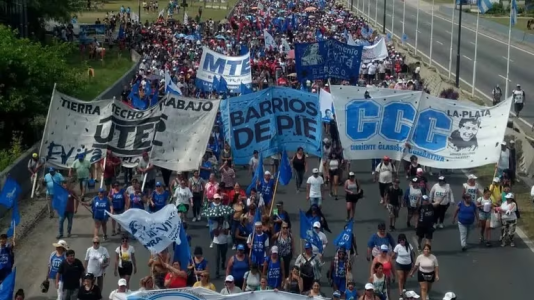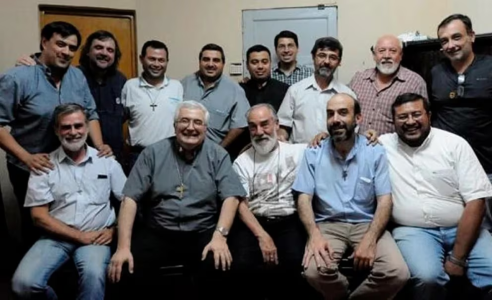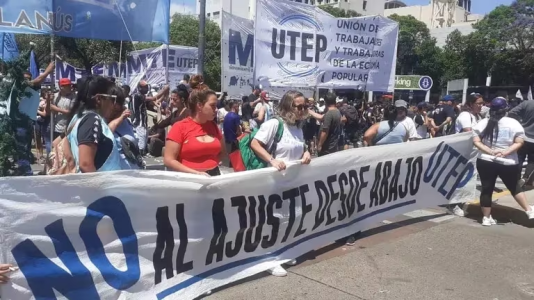dark
New member
Piqueteros will march again this week to the Ministry of Economy to demand for the soup kitchens and reject the adjustment - Infobae

Source:

 www.infobae.com
www.infobae.com
February 27, 2024
They question the definancing of the Socio-Urban Integration Fund that received 9% of the PAIS Tax collection and will now receive only 0.3%. The march will be on Thursday. The villero bishop, Monsignor Oscar Carrara, warned that the Government's decision “can generate a catastrophe”
By Andres Klipphan

March of UTEP, Barrios de Pie and the CCC (archive image)
The social movements grouped in the Popular Economy Workers Union (UTEP) will mobilize on Thursday at noon at the Ministry of Economy, headed by Luis “Toto” Caputo , against the modifications that the Executive Branch ordered in the distribution to the Fund of Socio-Urban Integration (FISU) that managed the social movements through their work cooperatives. The adjustment was applied by reducing the percentage that fed that fund through the collection of the PAIS tax - which is charged on foreign currency purchase operations - from 9% to a tiny percentage, just 0.3%.
These incomes, which in 2023 amounted to around six billion pesos, were channeled through social organizations such as the Evita Movement, the MTE, the CCC or Somos/Barrios de Pie, among others. They were used to urbanize settlements - of which more than six thousand - are registered in the National Registry of Popular Neighborhoods (ReNaTeP), and which was under the orbit of Fernanda Miño , former secretary of Socio-Urban Integration. That secretariat was part of the organization chart of the former Ministry of Social Development and which now moved to the Economy portfolio. Miño is a leader of the Movement of Excluded Workers (MTE), a social organization that is referenced by Juan Grabois , former presidential candidate for Unión por la Patria.

The Team of Priests from Villages and Popular Neighborhoods demonstrated against the definancing of the FISU. The vicar general of the archdiocese of Buenos Aires, Monsignor Oscar Carrara, warned that “it can generate a catastrophe”
Thursday's march will be led by the leaders and workers of the cooperatives that carry out works in popular neighborhoods. Alejandro “Peluca” Gramajo , general secretary of the UTEP, announced that “we will demand from the Government the decision to defund the popular neighborhood policy.”
The cut of the FISU, by La Libertad Avanza, was under study since the Omnibus Law fell in parliament. However, a sector of the Government denied it.
Yesterday, as soon as the decree was disseminated, the team of priests from Villas and Barrios Populares, and Hogar de Cristo of Argentina, spoke out against the measure.
The text, which has the signature of more than 50 priests, is titled “ No to cuts in public policies in towns, settlements and popular neighborhoods . ” In one of his most notable paragraphs he assures that the cut to the FISU: “It is a very hard blow that benefits more than 5 million residents, among whom the majority are minors. State intervention in the more than 5,000 popular neighborhoods throughout the country cannot decline. Lowering the FISU budget would be going backwards. We cannot tolerate such a setback that generates greater exclusion and, therefore, insecurity and social disintegration. Practically, it is the only public policy that targets the hard core of poverty.”
Among others, the statement is signed by José María Di Paola , better known as Father Pepe , a priest close to Pope Francis ; Lorenzo de Vedia , Facundo Ribeiro , Gastón Colombres , Carlos Olivero and Nicolás Angellotti .

The Executive Branch decided to modify the distribution of the Socio-Urban Integration Fund (FISU) administered by social movements through their work cooperatives (Source)
To understand the scope of the pruning of that fund, we must go back to Law 27,541, which had allocated the transfer of 30% of the tax collected to finance social housing works through the FISU, economic infrastructure works and promotion of the tourism.
As reported by this medium, decree 184/2020 issued by Alberto Fernández defined priorities and established 30% to be allocated to FISU, 65% to economic infrastructure works and 5% to tourism.
With the changes ordered yesterday by Javier Milei, only 1% will be transferred to the FISU and 94% for economic infrastructure works. The promotion of tourism will continue with the same 5% of the produced.
In mathematical terms, this means that of the 9% of the total produced by the PAIS Tax that the social movements received, they will now receive a nominal percentage of just 0.3 percent.
The Socio-Urban Integration Fund was created by Decree 819/2019 at the end of the Mauricio Macri government . Its objective was to finance socio-urban integration projects for Popular Neighborhoods that are registered in the National Registry of Popular Neighborhoods (ReNaBaP) and create Lots with services. It was not the only change he suffered, he had previously gone from the Ministry of Human Capital (continuer of Social Development) to the Treasury Palace.
In the last week, the FISU was under the Government's sights as a result of an audit where it was investigated whether there were irregularities in the management of money. However, the Executive Branch itself clarified that so far the audit “has not found any acts of corruption,” at least evident.
The vicar general of the archdiocese of Buenos Aires, and villero bishop, Monsignor Oscar Gustavo Carrara , also expressed himself against the Government's decision, warning that “it could generate a catastrophe . ”

The social movements, through Fernanda Miño, leader of the MTE referred to in Juan Grabois, were in charge of the National Registry of Popular Neighborhoods
“I think it is a mistake by the Government. One can correct mistakes. My wish is that it be corrected, we have time because otherwise it could generate a catastrophe. What do I mean? If there is no direct intervention in the slums or popular neighborhoods of Argentina, where more than five million people live - more than half of them are children and adolescents -, where poverty is multidirectional, there is no drinking water, no safe electricity (…) a mistake becomes a catastrophe in the medium term,” the bishop said in the radio program And Now Who Can Help Us?, by Ernesto Tenembaum.
As infobae learned from official sources, since the creation of the FISU, 1,278 integration works have been carried out in popular neighborhoods, reaching 5,060 settlements with housing works in which 6,517 interventions were carried out for an amount of almost 500 billion pesos, exactly $480,611. ,383,294.59 during the last four years. Almost 70% of them were distributed to “civil society organizations.”
The ongoing audit highlighted that a large percentage of the works were sidewalks and curbs, that the contracts - as in the tenders for food and oncological medicines - were directed, in this case, cooperatives linked to the social movements of the UTEP .
Based on these investigations, the Government decided to establish the FISU Executive Committee, which will be preceded by Sebastián Pareja , a man closely trusted by the President, since he was his political leader in the province of Buenos Aires.
Once the audit that supervises the destination of the billions of pesos destined for these works and in which piquetera companies and cooperatives intervene, the intention of Pareja - who holds the same position as Miño - is to pay - if everything is in order - all of the pending certificates for the year 2023, whose documentation involves about $20,000 million.
Pareja himself told this medium that, for the moment, “no major discretions were found” or irregularities in the funds managed by Miño.
From the UTEP, an organization that brings together the majority of social organizations aligned with the former ruling party, they warned that the defunding of the FISU will deactivate programs such as “my piece”, which served to assist vulnerable families who lived in overcrowded conditions.

The UTEP will march on Thursday to the Ministry of Labor against the cuts in the FISU
"Unfortunately, the government has made the decision to defund a policy to develop works in popular neighborhoods. With this decision, they will leave works halfway and prevent the further development of this policy that had a direct impact on the lives of the most humble," Gramajo, head of the UTEO and leader of Evita, told this medium. And he highlighted that thanks to FISU, among other benefits: “More than 250 thousand women who accessed the Mi Piece program and 187 thousand direct jobs, among other aspects that improve the quality of life of society. The government has made it clear that it only came to govern for a minority at the expense of the people and with great contempt for the most humble sectors, the workers, the retirees.”
Gramajo recalled that: “For that reason, next Thursday we are going to a day of protest in front of the Ministry of Economy with the workers of the popular economy cooperatives that had been developing the works to demand that the government not defund the neighborhoods. popular and stop pushing society into the abyss, causing social genocide.”

Source:

Piqueteros volverán a marchar esta semana al Ministerio de Economía para reclamar por los comedores populares y rechazar el ajuste
Cuestionan el desfinanciamiento del Fondo de Integración Socio Urbana que recibía el 9% de la recaudación del Impuesto PAIS y ahora recibirá sólo 0,3%. La marcha será el jueves. El obispo villero Monseñor Oscar Carrara, advirtió que la decisión del Gobierno “puede generar una catástrofe”
February 27, 2024
They question the definancing of the Socio-Urban Integration Fund that received 9% of the PAIS Tax collection and will now receive only 0.3%. The march will be on Thursday. The villero bishop, Monsignor Oscar Carrara, warned that the Government's decision “can generate a catastrophe”
By Andres Klipphan

March of UTEP, Barrios de Pie and the CCC (archive image)
The social movements grouped in the Popular Economy Workers Union (UTEP) will mobilize on Thursday at noon at the Ministry of Economy, headed by Luis “Toto” Caputo , against the modifications that the Executive Branch ordered in the distribution to the Fund of Socio-Urban Integration (FISU) that managed the social movements through their work cooperatives. The adjustment was applied by reducing the percentage that fed that fund through the collection of the PAIS tax - which is charged on foreign currency purchase operations - from 9% to a tiny percentage, just 0.3%.
These incomes, which in 2023 amounted to around six billion pesos, were channeled through social organizations such as the Evita Movement, the MTE, the CCC or Somos/Barrios de Pie, among others. They were used to urbanize settlements - of which more than six thousand - are registered in the National Registry of Popular Neighborhoods (ReNaTeP), and which was under the orbit of Fernanda Miño , former secretary of Socio-Urban Integration. That secretariat was part of the organization chart of the former Ministry of Social Development and which now moved to the Economy portfolio. Miño is a leader of the Movement of Excluded Workers (MTE), a social organization that is referenced by Juan Grabois , former presidential candidate for Unión por la Patria.

The Team of Priests from Villages and Popular Neighborhoods demonstrated against the definancing of the FISU. The vicar general of the archdiocese of Buenos Aires, Monsignor Oscar Carrara, warned that “it can generate a catastrophe”
Thursday's march will be led by the leaders and workers of the cooperatives that carry out works in popular neighborhoods. Alejandro “Peluca” Gramajo , general secretary of the UTEP, announced that “we will demand from the Government the decision to defund the popular neighborhood policy.”
The cut of the FISU, by La Libertad Avanza, was under study since the Omnibus Law fell in parliament. However, a sector of the Government denied it.
Yesterday, as soon as the decree was disseminated, the team of priests from Villas and Barrios Populares, and Hogar de Cristo of Argentina, spoke out against the measure.
The text, which has the signature of more than 50 priests, is titled “ No to cuts in public policies in towns, settlements and popular neighborhoods . ” In one of his most notable paragraphs he assures that the cut to the FISU: “It is a very hard blow that benefits more than 5 million residents, among whom the majority are minors. State intervention in the more than 5,000 popular neighborhoods throughout the country cannot decline. Lowering the FISU budget would be going backwards. We cannot tolerate such a setback that generates greater exclusion and, therefore, insecurity and social disintegration. Practically, it is the only public policy that targets the hard core of poverty.”
Among others, the statement is signed by José María Di Paola , better known as Father Pepe , a priest close to Pope Francis ; Lorenzo de Vedia , Facundo Ribeiro , Gastón Colombres , Carlos Olivero and Nicolás Angellotti .

The Executive Branch decided to modify the distribution of the Socio-Urban Integration Fund (FISU) administered by social movements through their work cooperatives (Source)
To understand the scope of the pruning of that fund, we must go back to Law 27,541, which had allocated the transfer of 30% of the tax collected to finance social housing works through the FISU, economic infrastructure works and promotion of the tourism.
As reported by this medium, decree 184/2020 issued by Alberto Fernández defined priorities and established 30% to be allocated to FISU, 65% to economic infrastructure works and 5% to tourism.
With the changes ordered yesterday by Javier Milei, only 1% will be transferred to the FISU and 94% for economic infrastructure works. The promotion of tourism will continue with the same 5% of the produced.
In mathematical terms, this means that of the 9% of the total produced by the PAIS Tax that the social movements received, they will now receive a nominal percentage of just 0.3 percent.
The Socio-Urban Integration Fund was created by Decree 819/2019 at the end of the Mauricio Macri government . Its objective was to finance socio-urban integration projects for Popular Neighborhoods that are registered in the National Registry of Popular Neighborhoods (ReNaBaP) and create Lots with services. It was not the only change he suffered, he had previously gone from the Ministry of Human Capital (continuer of Social Development) to the Treasury Palace.
In the last week, the FISU was under the Government's sights as a result of an audit where it was investigated whether there were irregularities in the management of money. However, the Executive Branch itself clarified that so far the audit “has not found any acts of corruption,” at least evident.
The vicar general of the archdiocese of Buenos Aires, and villero bishop, Monsignor Oscar Gustavo Carrara , also expressed himself against the Government's decision, warning that “it could generate a catastrophe . ”

The social movements, through Fernanda Miño, leader of the MTE referred to in Juan Grabois, were in charge of the National Registry of Popular Neighborhoods
“I think it is a mistake by the Government. One can correct mistakes. My wish is that it be corrected, we have time because otherwise it could generate a catastrophe. What do I mean? If there is no direct intervention in the slums or popular neighborhoods of Argentina, where more than five million people live - more than half of them are children and adolescents -, where poverty is multidirectional, there is no drinking water, no safe electricity (…) a mistake becomes a catastrophe in the medium term,” the bishop said in the radio program And Now Who Can Help Us?, by Ernesto Tenembaum.
As infobae learned from official sources, since the creation of the FISU, 1,278 integration works have been carried out in popular neighborhoods, reaching 5,060 settlements with housing works in which 6,517 interventions were carried out for an amount of almost 500 billion pesos, exactly $480,611. ,383,294.59 during the last four years. Almost 70% of them were distributed to “civil society organizations.”
The ongoing audit highlighted that a large percentage of the works were sidewalks and curbs, that the contracts - as in the tenders for food and oncological medicines - were directed, in this case, cooperatives linked to the social movements of the UTEP .
Based on these investigations, the Government decided to establish the FISU Executive Committee, which will be preceded by Sebastián Pareja , a man closely trusted by the President, since he was his political leader in the province of Buenos Aires.
Once the audit that supervises the destination of the billions of pesos destined for these works and in which piquetera companies and cooperatives intervene, the intention of Pareja - who holds the same position as Miño - is to pay - if everything is in order - all of the pending certificates for the year 2023, whose documentation involves about $20,000 million.
Pareja himself told this medium that, for the moment, “no major discretions were found” or irregularities in the funds managed by Miño.
From the UTEP, an organization that brings together the majority of social organizations aligned with the former ruling party, they warned that the defunding of the FISU will deactivate programs such as “my piece”, which served to assist vulnerable families who lived in overcrowded conditions.

The UTEP will march on Thursday to the Ministry of Labor against the cuts in the FISU
"Unfortunately, the government has made the decision to defund a policy to develop works in popular neighborhoods. With this decision, they will leave works halfway and prevent the further development of this policy that had a direct impact on the lives of the most humble," Gramajo, head of the UTEO and leader of Evita, told this medium. And he highlighted that thanks to FISU, among other benefits: “More than 250 thousand women who accessed the Mi Piece program and 187 thousand direct jobs, among other aspects that improve the quality of life of society. The government has made it clear that it only came to govern for a minority at the expense of the people and with great contempt for the most humble sectors, the workers, the retirees.”
Gramajo recalled that: “For that reason, next Thursday we are going to a day of protest in front of the Ministry of Economy with the workers of the popular economy cooperatives that had been developing the works to demand that the government not defund the neighborhoods. popular and stop pushing society into the abyss, causing social genocide.”

